

HACCP en AUSTRALIE et NOUVELLE ZELANDE. Food Safety. Food safety is an important issue.
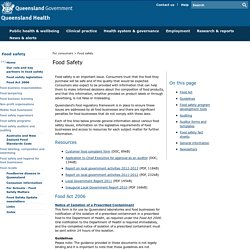
Consumers trust that the food they purchase will be safe and of the quality that would be expected. Consumers also expect to be provided with information that can help them to make informed decisions about the composition of food products, and that this information, whether provided on product labels or through advertising, is not false or misleading. Queensland's food regulatory framework is in place to ensure these issues are addressed by all food businesses and there are significant penalties for food businesses that do not comply with these laws. Each of the links below provide general information about various food safety issues, information on the legislative requirements of food businesses and access to resources for each subject matter for further information. Resources. General-food-safety-template. Fs%20template%20for%20commercial%20food%20services. 21883. Food safety program templates: Food Safety - Department of Health, Victoria.
Page content: Registered templates | The Class 2 food business template | FoodSmart | Community group temporary and mobile food premises template - class 2 | Template development kit.
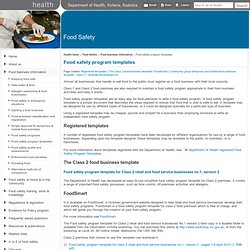
Food Safety. Food safety is an important issue.
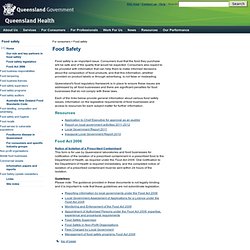
Consumers trust that the food they purchase will be safe and of the quality that would be expected. Consumers also expect to be provided with information that can help them to make informed decisions about the composition of food products, and that this information, whether provided on product labels or through advertising, is not false or misleading. Queensland's food regulatory framework is in place to ensure these issues are addressed by all food businesses and there are significant penalties for food businesses that do not comply with these laws. Each of the links below provide general information about various food safety issues, information on the legislative requirements of food businesses and access to resources for each subject matter for further information.
Resources. Complete_safefood.pdf. Food Safety Standards (Australia only) Page Content (July 2014) Food safety standards place obligations on Australian food businesses to produce food that is safe and suitable to eat.
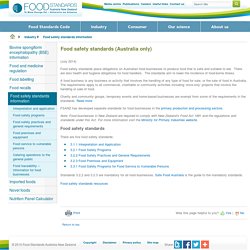
There are also health and hygiene obligations for food handlers. The standards aim to lower the incidence of food-borne illness. A food business is any business or activity that involves the handling of any type of food for sale, or the sale of food in Australia. Charity and community groups, temporary events and home-based businesses are exempt from some of the requirements in the standards.
FSANZ has developed separate standards for food businesses in the primary production and processing sectors. Note: Food businesses in New Zealand are required to comply with New Zealand’s Food Act 1981 and the regulations and standards under this Act. Food and beverage industry regulations and compliance. Food safety regulations apply to each stage of food and beverage production, from processing and manufacture to distribution.
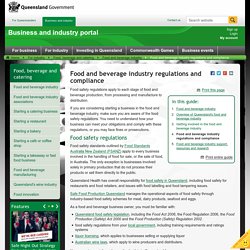
If you are considering starting a business in the food and beverage industry, make sure you are aware of the food safety regulations. You need to understand how your business can meet your obligations and comply with these regulations, or you may face fines or prosecutions. Food safety regulations Food safety standards outlined by Food Standards Australia New Zealand (FSANZ) apply to every business involved in the handling of food for sale, or the sale of food, in Australia. The only exception is businesses involved solely in primary production that do not process their products or sell them directly to the public. NSW Food Authority: safer food, clearer choices. Retail outlets and restaurants. Overview NSW has around 50,000 food businesses, including bakeries, B&Bs, beekeepers, butchers, canteens, charity groups, delicatessens, health food shops, home delivery services, hotel/motel operations, kiosks, licensed clubs, food manufacturers and packers, pharmacies, pubs, restaurants, service stations, street vendors, takeaways, food transporters and wineries.
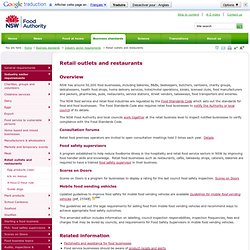
The NSW food service and retail food industries are regulated by the Food Standards Code which sets out the standards for food and food businesses. The Food Standards Code also requires retail food businesses to notify the Authority or local council of its details. The NSW Food Authority and local councils work together at the retail business level to inspect notified businesses to verify compliance with the Food Standards Code. Consultation forums Retail food premises operators are invited to open consultation meetings held 3 times each year.